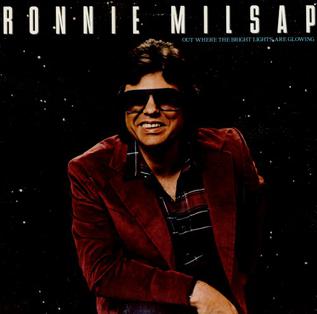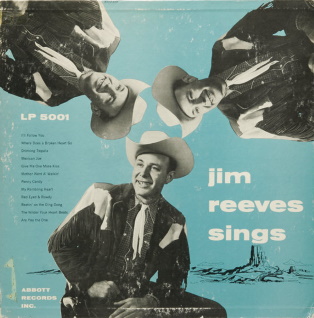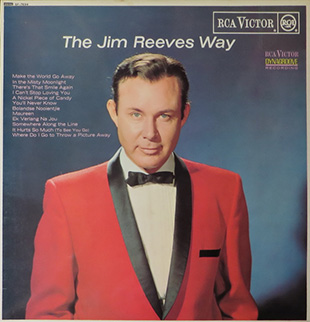Related Research Articles

James Travis Reeves was an American country and popular music singer and songwriter. With records charting from the 1950s to the 1980s, he became well known as a practitioner of the Nashville Sound. Known as "Gentleman Jim", his songs continued to chart for years after his death in a plane crash. He is a member of both the Country Music and Texas Country Music Halls of Fame.
"Tammy" is a popular song with music by Jay Livingston and lyrics by Ray Evans. It was published in 1957 and made its debut in the film Tammy and the Bachelor. It was nominated for the 1957 Oscar for Best Original Song. "Tammy" is heard in the film in two versions. The one that became a No. 1 hit single for Debbie Reynolds in 1957 is heard midway through the film, and was a UK No. 2 hit single in the same year. Another version was heard during the main titles at the beginning of the film and was a hit for the Ames Brothers. There have been other cover versions of the song.
"Butterfly" is a popular song written by Bernie Lowe and Kal Mann and published in 1957. The song is credited to Anthony September as songwriter in some sources. This was a pseudonym of Anthony Mammarella, producer of American Bandstand.

"I Can't Stop Loving You" is a popular song written and composed by country singer, songwriter, and musician Don Gibson, who first recorded it on December 3, 1957, for RCA Victor Records. It was released in 1958 as the B-side of "Oh, Lonesome Me", becoming a double-sided country hit single. At the time of Gibson's death in 2003, the song had been recorded by more than 700 artists, most notably by Ray Charles, whose recording reached No. 1 on the Billboard chart.
"I'm Gonna Sit Right Down and Write Myself a Letter" is a 1935 popular song with music by Fred E. Ahlert and lyrics by Joe Young. It has been recorded many times, and has become a standard of the Great American Songbook. It was popularized by Fats Waller, who recorded it in 1935 at the height of his fame.

RCA Studio B was a music recording studio in Nashville, Tennessee established in 1957 by Steve Sholes and Chet Atkins for RCA Victor. Originally known simply as the RCA Victor Studio, in 1965 the studio was designated as Studio B after RCA Victor built the newer, larger Studio A in an adjacent building.
"This Can't Be Love" is a show tune and a popular song from the 1938 Rodgers and Hart musical The Boys from Syracuse when it was sung by Eddie Albert and Marcy Westcott. The lyrics poke fun at the common depiction of love in popular songs as a host of malignant symptoms, saying, "This can't be love because I feel so well."
"You're Nobody till Somebody Loves You" is a popular song written by Russ Morgan, Larry Stock, and James Cavanaugh and published in 1944. The song was first recorded by Morgan and was a hit for him in 1946, reaching the No. 14 spot in the charts. The best known version was Dean Martin's, which was released in 1960 and reissued in 1964.

The discography of American country music singer Marty Robbins consists of 52 studio albums, 13 compilation albums, and 100 singles. In his career, Robbins has charted 17 Number One singles on the Billboard Hot Country Songs charts, as well as 82 Top 40 singles.

Out Where the Bright Lights Are Glowing is a studio album by American country music artist Ronnie Milsap, released in 1981 by RCA Records. The album produced one single, "Am I Losing You", which was a #1 hit for Milsap. The album is a tribute to the late Jim Reeves, and all songs are covers of Reeves songs, except for two new tunes, which were written about Reeves specifically for this project. The two new songs are "Out Where the Bright Lights are Glowing" and "Dear Friend".
"Am I Losing You" is a 1957 single written and first recorded by American country music artist Jim Reeves. It spent two weeks at number three on the country singles chart. A 1960 re-recording peaked at number eight on the same chart, and number 31 on the Billboard Hot 100; this version was the B-side to the single "I Missed Me", which also peaked at number three on the country chart.
"Welcome to My World" is a popular music standard written by Ray Winkler and John Hathcock and recorded by many artists, most notably Jim Reeves. The melody was likely written by Eddie McDuff rather than Winkler. A traditional love song, the bridge includes lyrics taken from Matthew 7:7–8.
"Send Me the Pillow You Dream On" is a country song written and recorded by Hank Locklin. The song has become a standard for the Nashville sound, and has been covered by pop, country, and bluegrass artists.
"Return to Me" is a song with music by Carmen Lombardo and lyrics by Danny Di Minno. The song was released in 1958 by Dean Martin. Martin recorded the song again in 1961 for his album Dino: Italian Love Songs.
"Missing You" is a song written by Red Sovine and Dale Noe, which was originally released by Red Sovine in 1955, and was later a hit single for Webb Pierce in 1957, Ray Peterson in 1961, and was posthumously a hit for Jim Reeves in 1972. Sovine's version was the B-side of Red Sovine and Webb Pierce's hit single "Why Baby Why".

God Be with You is an album of sacred songs recorded by country singer Jim Reeves and released in February 1959 on the RCA Victor label.

Singing Down the Lane is an album recorded by country music singer Jim Reeves. Released in June 1956, it was his first album for RCA Victor.

Country Hall of Fame is a studio album by American country singer–songwriter Hank Locklin. It was released in February 1968 via RCA Victor Records and contained 12 tracks. The album was co-produced by Chet Atkins and Felton Jarvis. The album's name was derived from its single of the same, which became Locklin's first major hit in several years. It would also be his seventeenth studio recording released in his career and one of many to be produced by Chet Atkins. Country Hall of Fame received positive reviews from writers and publications.

Jim Reeves Sings is the debut studio album by Jim Reeves, released in 1955 by Abbott Record Co.

The Jim Reeves Way is a studio album by Jim Reeves, released posthumously in 1965 on RCA Victor. It was produced by Chet Atkins and Bob Ferguson.
References
- ↑ Jordan, Larry (January 1, 2011). Jim Reeves: His Untold Story. pp. 202–203. ISBN 9780615524306.
- ↑ Jordan, Larry (2011). Jim Reeves: His Untold Story. Iowa, USA: PageTurner Books International. p. 201. ISBN 978-0-615-52430-6.
- ↑ Jordan, Larry (2011). Jim Reeves: His Untold Story. Iowa, USA: PageTurner Books International. pp. 201–203. ISBN 978-0-615-52430-6.
- ↑ Jordan, Larry (2011). Jim Reeves: His Untold Story. Iowa, USA: PageTurner Books International. p. 226. ISBN 978-0-615-52430-6.
- ↑ Jim Reeves' "Four Walls" Chart Position Retrieved June 19, 2012.
- ↑ "CHUM Hit Parade - June 10, 1957".
- ↑ Whitburn, Joel (2004). The Billboard Book of Top 40 Hits (8th ed.). New York: Billboard Books. p. 383. ISBN 0-8230-7499-4.
- ↑ "45cat.com". 45cat.com. Retrieved May 24, 2017.
- ↑ "Discogs.com". Discogs.com. 1962. Retrieved May 24, 2017.
- ↑ "Discogs.com". Discogs.com. 1962. Retrieved May 24, 2017.
- ↑ "Discogs.com". Discogs.com. 1967. Retrieved May 24, 2017.
- ↑ "Discogs.com". Discogs.com. 1968. Retrieved May 24, 2017.
- ↑ "Discogs.com". Discogs.com. 1977. Retrieved May 24, 2017.